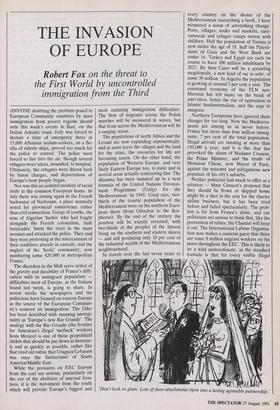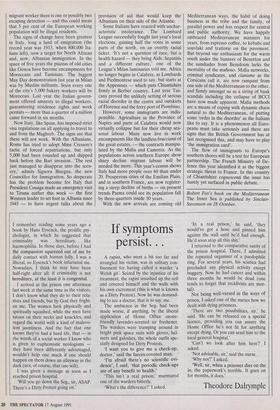THE INVASION OF EUROPE
Robert Fox on the threat to
the First World by uncontrolled immigration from the Third
ANYONE doubting the problem posed to European Community countries by mass immigration from poorer regions should note this week's events in Ban, on the Italian Adriatic coast. Italy was forced to declare a state of emergency there as 13,000 Albanian asylum-seekers, on a flo- tilla of elderly ships, proved too much for the police to control. The police were forced to fire into the air, though several refugees were taken, wounded, to hospital. Ultimately, the refugees were driven back by baton charges, and deportations of Europe's boat people began.
Nor was this an isolated incident of racial strife in the common European home. In July there was rioting again in the French backwater of Narbonne, a place normally noted for provincial somnolence rather than civil commotion. Gangs of youths, the sons of Algerian 'harkis' who had fought alongside the French colonialists, built barricades, burnt the trees in the main avenues and attacked the police. They said they were protesting at the mistreatment of their confreres already in custody, and the neglect of the 'hark? community, now numbering some 420,000 in metropolitan France.
The disorders in the Midi serve notice of the gravity and durability of France's diffi- culties with its immigrant population — difficulties most of Europe, as the Italians found last week, is going to share. In recent weeks the newspapers and the politicians have focused on eastern Europe as the source of the European Commun- ity's concern on immigration. The Oder has been described with stunning unorigi- nality as 'Europe's new Rio Grande'. The analogy with the Rio Grande (the frontier for American's illegal 'wetback' workers from Mexico) is one of those geopolitical cliches that should be put down as humane- ly and as quickly as possible, rather like that tired old rubric that Uruguay/Lebanon was once the Switzerland of South America/Middle East.
While the pressures on EEC Europe from the east are serious, particularly on the eve of the abolition of internal fron- tiers, it is the movement from the south which will provide Europe's biggest and most enduring immigration difficulties. The flow of migrants across the Polish marches will be measured in waves, but that from across the Mediterranean will be a surging ocean. The populations of north Africa and the Levant are now expanding exponentially, and as more leave the villages and the land for the cities, the resources for life are becoming scarce. On the other hand, the population of Western Europe, and very likely Eastern Europe too, is static and in several areas actually contracting fast. The dilemma has been summed up in a neat formula of the United Nations Environ- ment Programme (Unep) for the Mediterranean. In 1945, Unep says, two- thirds of the coastal population of the Mediterranean were on the northern Euro- pean shore (from Gibraltar to the Bos- phorus). By the end of the century the position will be exactly reversed, with two-thirds of the peoples of the littoral living on the southern and eastern shores — and still producing only 10 per cent of the industrial wealth of the Mediterranean neighbourhood. In travels over the last seven years to every country on the shores of the Mediterranean researching a book, I have witnessed a scene of astonishing change. Ports, villages, souks and markets, cara- vanserais and refugee camps swarm with children. Half the population of Tunisia is now under the age of 18, half the Palesti- nians of Gaza and the West Bank are under 16. Turkey and Egypt are each on course to have 100 million inhabitants by 2025. By then Cairo will be a sprawling megalopolis, a new kind of rus in urbe, of some 30 million. In Algeria the population is growing at around 3 per cent a year. The command economy of the FLN neo- Marxists has left many on the brink of starvation, hence the rise of opposition in Islamic fundamentalism, and the urge to emigrate.
Northern Europeans have ignored these changes for too long. Now the Mediterra- neans are among us as never before. France has more than four million immig- rants, 7 per cent of the total population. Illegal arrivals are running at more than 150,000 a year, and it is this that has provoked the alarm of Madame Cresson, the Prime Minister, and the tirade of Monsieur Chirac, now Mayor of Paris, against the noisome and polygamous new populace of his city's suburbs.
Neither politician had much to offer as a solution — Mme Cresson's proposal that they should be flown or shipped home might be a shot in the arm for the charter airline business, but it has been tried before and failed spectacularly. The prob- lem is far from France's alone, and our politicians are unwise to think that, like the prevention of rabies, the Channel will keep it out. The International Labour Organisa- tion now makes a cautious guess that there are some 8 million migrant workers on the move throughout the EEC. This is likely to be a wild underestimate, as the standard formula is that for every visible illegal 'Don't look so glum. Lots of these attachments ripen into a lasting agreeable partnership.' migrant worker there is one or possibly two escaping detection — and this could mean that 5 per cent of the European working population will be illegal residents.
The signs of change have been greatest in Italy, long a land of emigration (the record year was 1913, when 800,000 ha- Hans left), now a target for North African and, now, Albanian immigration. In the space of five years the piazzas of old cities like Genoa have become encampments for Moroccans and Tunisians. The biggest May Day demonstration last year in Milan was by Muslim militants. Soon every one of the city's 5,000 bakery workers will be Moroccan. Last year the Italian govern- ment offered amnesty to illegal workers, guaranteeing residence rights and work permits — more than a quarter of a million came forward in six months.
Now Italy, like Spain, has imposed strict visa regulations on all applying to travel to and from the Maghreb. The signs are that these will not work. With the Albanians, Rome has tried to adopt Mme Cresson's tactic of forced repatriations, but only 5,000 had been rounded up and shipped back before the Bari invasion. `The rest just managed to disappear into the scen- ery,' admits Signora Bisegna, the new Councillor for Immigration. So desperate has the problem become for Italy that President Cossiga made an emergency visit to Tirana earlier this week — the first Western leader to set foot in Albania since 1945 — to have urgent talks about the provision of aid that would keep the Albanians on their side of the Atlantic.
Some Italians have reacted with unchar- acteristic intolerance. The Lombard League successfully fought last year's local elections, gaining half the votes in some parts of the north, on an overtly racial ticket. 'It's not a question of race, but a health hazard — they bring Aids, hepatitis and a different culture,' one of the League's Milan luminaries told me. Africa no longer begins in Calabria, as Lombards and Piedmontese used to say, but starts at the Appenines — which puts Chiantishire firmly in Berber country. Last year Tus- cany proved the unlikely setting of serious racial disorder in the centre and outskirts of Florence and the ferry port of Piombino.
However, some immigrants are indis- pensible. Agriculture in the Province of Naples and parts of Calabria would now virtually collapse but for their cheap sea- sonal labour. Many now live in work encampments like the landless braccianti of the great estates, — the contracts manipu- lated by the Mafia and Camorra. As the populations across southern Europe show sharp decline migrant labour will be needed the more. This year's census shows Italy had more people over 60 than under 20. Prosperous cities of the EmiIlan Plain, and in southern France, are now register- ing a steep decline of births — on present trends Parma could see its population fall by three-quarters inside 50 years.
With the new arrivals are coming old
Mediterranean ways, the habit of doing business in the tribe and the family, of parallel power and less respect for central and public authority. We have happily embraced Mediterranean manners for years, from espresso coffee, to kebabs and souvlaki and trattorie on the pavement. But beyond our enthusiasm for the warm south under the banners of Benetton and the sunshades from Benidorm lurks the mentality of the mafioso. Mafia networks, criminal syndicates, and clanisme as the Corsicans call it, are now rampant from one side of the Mediterranean to the other, and firmly amongst us as a string of bank scandals including the collapse of BCCI have now made apparent. Mafia methods are a means of coping with dynamic chaos natural to the Mediterranean, of putting some 'order in the disorder' as the Italians like to say. It is a phenomenon all Euro- peans must take seriously and there are signs that the British Government has at last recognised this, and may have to play `the immigration card'.
The flow of immigrants to Europe's southern shores will be a test for European partnership. The French Ministry of De- fence this year identified it as the biggest strategic threat to France. In this country of Chiantishire cognoscenti the issue has barely yet surfaced in public debate.
Robert Fox's book on the Mediterranean The Inner Sea is published by Sinclair- Stevenson on 28 October.



















































 Previous page
Previous page